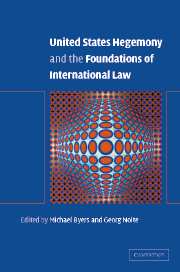Book contents
- Frontmatter
- Contents
- List of contributors
- Preface
- Introduction: the complexities of foundational change
- PART I International community
- PART II Sovereign equality
- PART III Use of force
- PART IV Customary international law
- 10 Powerful but unpersuasive? The role of the United States in the evolution of customary international law
- 11 Hegemonic custom?
- 12 Comments on chapters 10 and 11
- PART V Law of treaties
- PART VI Compliance
- Conclusion
- Index
12 - Comments on chapters 10 and 11
Published online by Cambridge University Press: 13 July 2009
- Frontmatter
- Contents
- List of contributors
- Preface
- Introduction: the complexities of foundational change
- PART I International community
- PART II Sovereign equality
- PART III Use of force
- PART IV Customary international law
- 10 Powerful but unpersuasive? The role of the United States in the evolution of customary international law
- 11 Hegemonic custom?
- 12 Comments on chapters 10 and 11
- PART V Law of treaties
- PART VI Compliance
- Conclusion
- Index
Summary
Rainer Hofmann
The bipolar world – in which the United States and the Soviet Union were the two superpowers – belongs to the past. At present, there is but one hegemon in international politics, the United States. What impact might this fact have on international law or, more precisely, on customary international law?
It was in 1973 that, as a student, I had my first encounter with public international law. Among the things I still remember from that course is that customary law – the creation and existence of customary law – depended on a universal and longstanding practice of States and – as an additional precondition – that this state practice reflected a universal opinio juris sive necessitatis. The underlying rationale of these two conditions was the principle of sovereign equality among States. In addition, we were taught that the fundamental aim, the basic justification of this concept of customary law, was but a reflection of what was – or should be considered as – the final aim of law as such, or of any legal system, namely the protection of the “weak” against the brute force of the “strong.” In other words: The task of international law consisted, inter alia, in protecting the interests and rights of the less powerful State against the military and other forces of the more powerful State.
- Type
- Chapter
- Information
- United States Hegemony and the Foundations of International Law , pp. 348 - 360Publisher: Cambridge University PressPrint publication year: 2003

